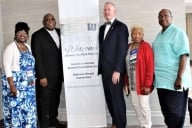You have /5 articles left.
Sign up for a free account or log in.
Libraries are a boon to journalism. No, I’m not referring to taking out subscriptions or encouraging literacy or filling a gap when local reporting no longer exists -- I mean the ad revenue generated whenever an article is published arguing libraries are doing it wrong. They get a lot of clicks.
When Forbes published an op-ed arguing we replace public libraries with Amazon, the pile-on was so fierce the piece was yanked. Forbes said it was because the column was outside the expertise of the author, though that has never stopped anyone. Now The Atlantic has a story arguing students don’t want anything “fancy” from their academic libraries, just a “normal” library with books and a place to study, so knock off all the glitzy innovation. To which many librarians have objected, asking, “Why not have both?”
Libraries need to try new things, not just to placate an administration demanding innovation or impress prospectives on tour (they probably are more awed by an abundance of books than by tech equipment they may have at their high school -- quite possibly in the room that used to be a library), but because libraries are common ground for an academic community and a good place to test out new services and tools that some members of that community might find valuable. Better to have assistance with, say, GIS in a library that’s open late than in three or four separate department labs with limited access. I’m not saying there isn’t sometimes a need for a department to have its own dedicated lab -- but if an institution wants to invest resources in GIS or 3-D printing or video production and a lot of people want those resources, it sometimes makes sense to share.
Sure, sometimes a library tries something that doesn’t take off. There was a vogue for 3-D printers in libraries when they were new; I suspect some are gathering dust or were quietly retired, outdated before they got much use. It happens. We buy books that never get checked out, too, and license bundles of journals that contain a large percentage of titles that are never used. It would be sweet to know exactly what someone might find useful someday, but we don’t have that crystal ball.
Libraries need to add new services that make sense locally and aren’t just following trends, but they also need to maintain things (or as I’ve argued in the past, “we don’t have to be everything, but we do need to be a library”). Two recent conferences speak to these seemingly divergent impulses. Designing Libraries is an annual gathering held at different libraries to share ideas about new library spaces and services; it just had its eighth conference at Georgia Tech (where the library’s tagline is “creating the next”). At the same time, The Maintainers is wrapping up its third conference, focusing on “the concepts of maintenance, infrastructure, repair, and the myriad forms of labor and expertise that sustain our human-built world.” The conference is open to a wide range of topics, but my Twitter feed was paying attention to the everyday and uncelebrated work of librarians and archivists, work that needs doing but is too often unfunded and underappreciated. It's work that all those new innovations will need if they are to be sustained.
When writers demand to know why libraries exist when we have Amazon or, another form of clickbait, complain that libraries have abandoned their true purpose, we’re creating a false conflict. We need to support new ways of creating and sharing ideas, whether it’s adding support for data science or video production or digital humanities, if that supports the community's work. We also need to maintain the things worth keeping, and respect that labor.
It’s a tricky balance at the best of times, but when austerity demands sacrifices, it can set up false dichotomies. If we spend money on this, we can’t have that; if we add that, we must be disparaging this. There’s a point beyond which it’s mathematically impossible to do more with less. But libraries have lots of practice supporting the various needs of people who don’t always want the same thing. Let’s give ourselves room to try new things while also maintaining things that have enduring value and stop thinking about it as a competitive zero-sum game.





